610 Search Results for visual support
September 4, 2013
by Robin Parker -
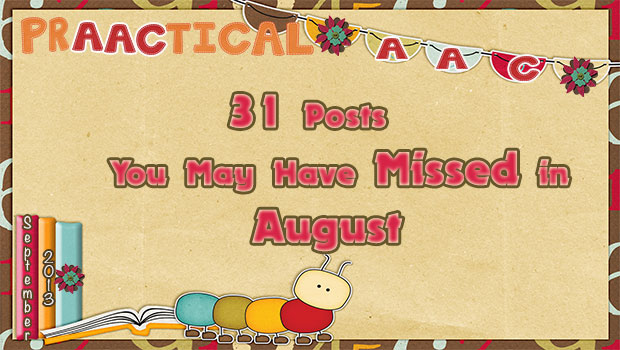
Strategy of the Month Back to School with AAC AAC ‘Must Haves’ for the Classroom & Speech Room PrAACtical Partnerships: AAC & Academics AAC Around the School and Beyond Core Words & the Curriculum PrAACtical Thinking 5 Things to Remember About AAC Technology Fun Friday Commenting to the Max 31 Posts You May Have Missed in July Keep Calm & …………. Great Music Apps & AAC Language Goals 5 Free Resources for Making Communication Boards & Visual Supports 5 Reasons to Say Yes to ‘NO’ Magic Moments with Tellagami Watch It Wednesday: AAC Core Word Vocabulary teaching by Gail Tatenhove & Robin 5 Ways to Use Sequenced Message SGDS and APPS 7 Writing Apps & Activities for ALL Writers PrAACtical Uses of QR Codes Watch This: Example of Teaching Expressive Language with the iPad & AAC Device by the Awesome AAC Chicks 5 Things to Consider About Data Collection in... [Read More...]
August 31, 2013
by Robin Parker -
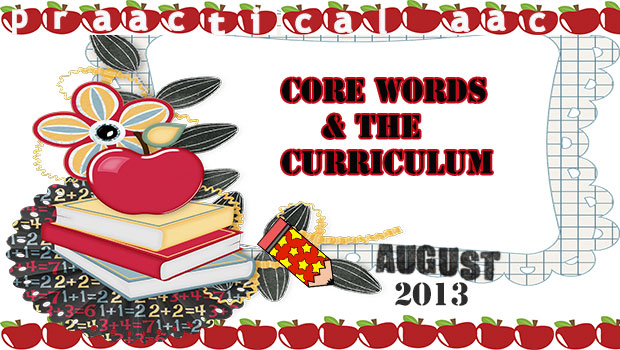
Core words can easily be incorporated into academic curriculum. There just needs to be systematic planning for core word vocabulary and then of course the joining of fringe words. One of the best visual explanations of core words is in the now ‘famous’ you tube video Language Stealers (HD). If you have not seen it, it is worth watching for many reasons but in the context of this post, it perfectly illustrates how you can teach about Greek and Roman history with core words. Planning for Core Words for the Classroom (& ALL School Activities) Have the core word communication board with you at ALL times– If you (SLP/Educator) have your core word communication board, you can model and teach the target core words during all lessons. A premise of this approach is that the student has access to their core word vocabulary display on a no-tech communication board or on their... [Read More...]
August 30, 2013
by Robin Parker -
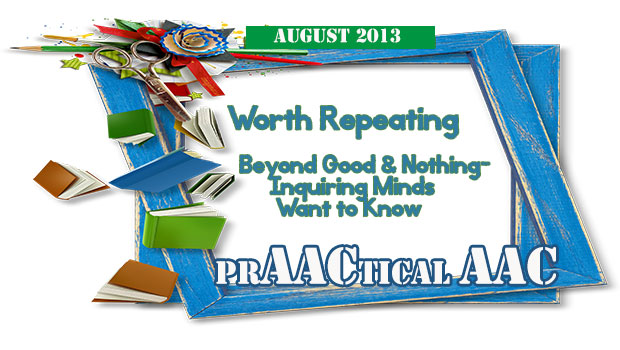
by Carole Zangari, originally published on August 27, 2012 “How was school?” (Good) “What did you do?” (Nothing) This scenario plays out in many cars and kitchens in the after school hours and it can be hard to know who is more frustrated: the kids for being asked or the parents for not getting satisfactory answers. And still, we repeat the process day after day. Of course, we want to know the fine details of what happened and how our children felt, but in some cases, we’d settle for ANY school-related conversation at all. I’ll be the first to admit that it took me way too long to get the hang of how to get information about my children’s school days, and it seemed like just when I did, pow! They were pre-teens and then teenagers. New rule book. Here are some ‘lessons learned’ along the way about those afterschool conversations and... [Read More...]
August 24, 2013
by Robin Parker -
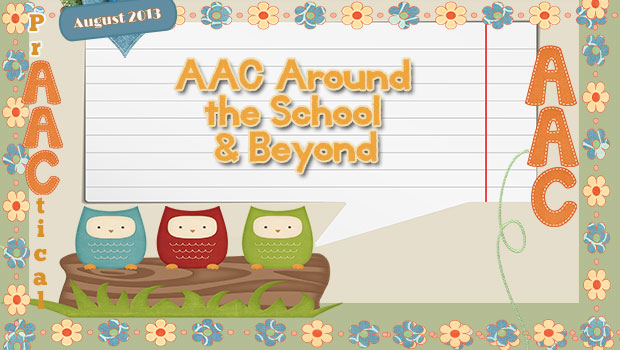
For the August Strategy of the Month, we have been thinking, writing, & talking about AAC in School. School is where AAC learners spend a large portion of their days. There needs to be multiple opportunities for students to USE and LEARN AAC each day. More than that though, we strive for full participation and interaction for students who use AAC. Students should not have to prove that they can do these things before they have ACCESS to AAC strategies and intervention. Here are some things that can be done to help build AAC participation for both students and educators. Provide ACCESS to AAC devices and visual supports throughout ALL activities in ALL places in school and on school sponsored trips/community based instruction. Provide Aided Language Input when teaching AAC to students. Use a Core Word approach when teaching AAC to students but don’t forget about Fringe Vocabulary. Learn and use partner assisted communication... [Read More...]
August 10, 2013
by Robin Parker -
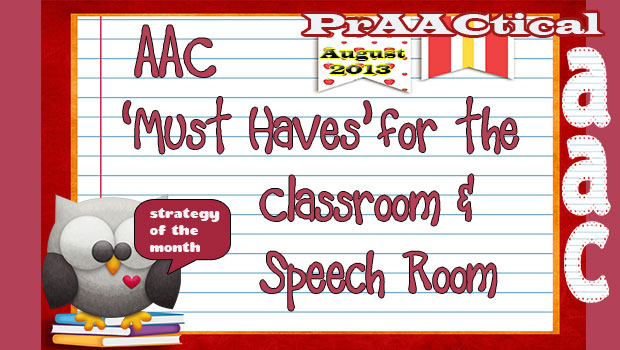
As we were getting ready for back to school and thinking about ‘must haves’, it quickly became apparent that it is not so easy to narrow it down. And the ‘must haves’ would definitely vary depending upon type of class, students, and even school. Based on a wide variety of differences, we organized a wide variety of choices to explore (we apologize in advance if we got carried away but…). Choose what you need, bookmark what you may need later and let us know your ‘must haves’ for a classroom and speech room AAC collaborative approach. We will create an ongoing list. Get Started Before School Starts Do these 10 Things to Get Started with AAC if you are new to an AAC student or classroom Provide AAC Support in the Classroom. Support teachers and educators with tips from Jane Farrall, & learn about AAC in the Classroom by Joan... [Read More...]
August 5, 2013
by Robin Parker -
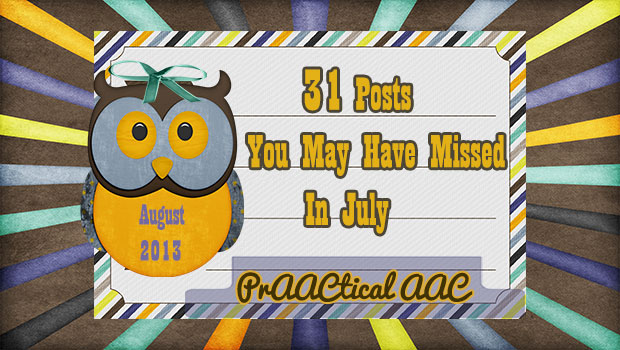
PrAACtical Thinking Free Text-based AAC Apps for the iPad PrAACtical Questions: Can Students Take Their AAC Device Home? PrAACtical AAC Learning & July 4th: Get Ready Get Set Go 4 Free July 4th Apps to SPARK Commenting 30 Posts You May Have Missed in June 4+AAC Tips for Talking About July 4th AFTER the Festivities PrAACtically Ready to Read Did You Know: AADMD Offers Specialty Webinars Visual Schedule Myths Live On..& On Getting to Yes Working with Worksheets Apps to Prepare, Learn, & Talk About Summer Vacations Modify a Battery-Operated Toy To Make It Accessible By Switches 5 Great Ways To Help People with AAC Needs Develop Inner Speech What’s the Connection: Core Vocabulary and Visual Schedules Random App of Kindness Giveaway: Talk About Food Create Your Own Style PECS Book 5 Things to Consider About Assigning ‘Homework’ to Your AAC Clients 8Friday Fun: 8 AAC Activities that are Fast... [Read More...]
July 9, 2013
by Robin Parker -
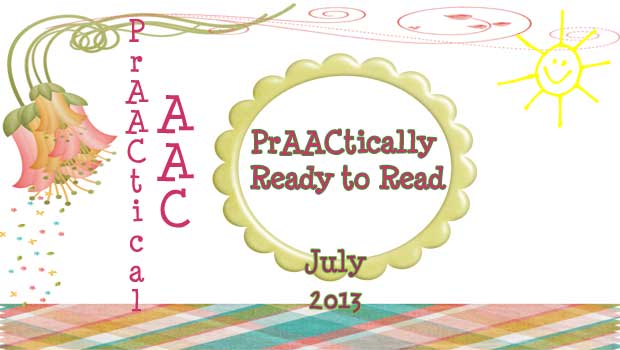
It’s summer and hot where we live (really hot!), humid (really humid)!. This weather makes it a good time for quiet, peaceful activities. Reading is high on our list. No pressure, enjoyable reading. We want ALL learners to enjoy reading. From simple single message voice output devices/apps to high-tech core language based SGDs and everywhere in between, there are lots of prAACtical opportunities for communication building, literacy learning, and just plain fun through reading. Interactive reading, reading aloud to someone, or reading to yourself can all be done in air-conditioned homes or libraries or by the pool or beach where you can cool down with a quick swim. Here are some great resources for adapted books, communication boards to go with books, and visual supports to help with reading. Find a good book, stay cool, and enjoy: New York City Department of Education: Adapted Books Baltimore City Schools- Book Specific Communication... [Read More...]
June 27, 2013
by Robin Parker -
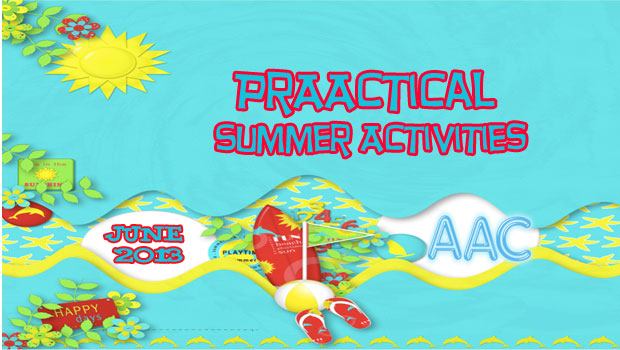
It’s summer time and hopefully you have some time for some fun meaningful language experiences. There are many resources to help prAACtically support many summer time traditional activities. Check these out: Swimming– Special Education British Columbia- Picture Set has a great visual support for pool routines. Tammy Anderson from Aqua Pros Swim School shares Innovative and Fun Visual Supports for teaching swimming. Cooking– Recipes visualized from Dade County Schools (need boardmaker software to open) OR Recipes visualized from Your Special Chef (no boardmaker necessary) Bubbles are a great outdoor activity for the summer. SLP Tanna Neufeld shares her ideas and communication displays to make bubbles a meaningful language learning experience. Nature Walks- Visual checklists help make nature walks meaningful language experiences. The checklist provides a visual organization that can build in symbol/language learning as well as providing an easy way to talk about the event after it is over. Check Lakeshore... [Read More...]
June 9, 2013
by Robin Parker -
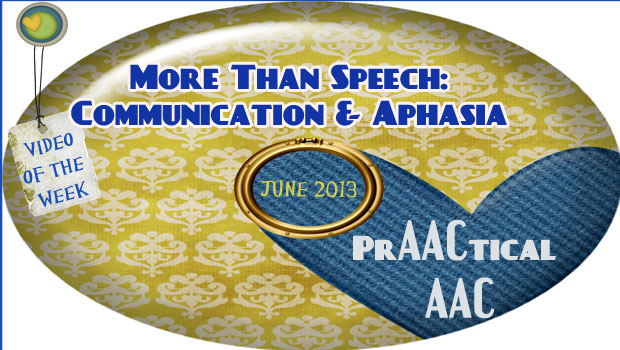
Life is Larger Than… APHASIA is the title of the Aphasia Institute’s 30th anniversary video made by group members, volunteers, and staff. Although life is larger than… APHASIA, the power of communication and sharing stories is so apparent. Enjoy the video, but check out the Aphasia Institute’s website for resources, information and a visual support for understanding the mission: “Giving hope to people with aphasia and their families by developing and sharing innovative solutions that reduce language barriers to full life participation”.
June 8, 2013
by Robin Parker -
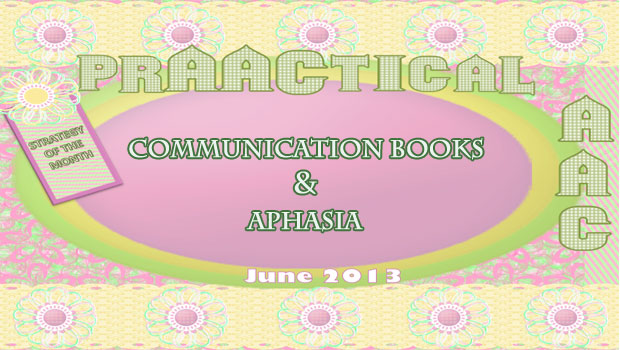
We know aphasia intervention has moved well beyond traditional speech and language training and intervention. We are so happy it has moved to an authentic participation, functional communication, and social interaction focus. Communication books are one tool for helping people with aphasia be active participants in conversation and comprehensive communication. Here are some thoughts and ideas about communication books to get started. Communication Books- Communication books for adults with aphasia can be in grid format with relevant communication messages. There can be a few pages or many, but keep in mind that the more pages, the longer it will take to navigate. It is most important to include high priority and relevant messages that will support needed communication and not just ‘standard’ messages. There are many samples and templates that can be purchased or downloaded for adult communication books. These may be good as a start, but should be individualized when... [Read More...]









